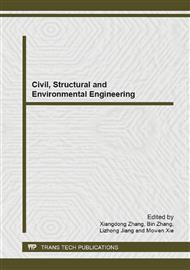p.545
p.551
p.555
p.559
p.564
p.569
p.574
p.579
p.586
Effect of the Expansion Agent on Early-Age Autogenous Shrinkage Stress of Concrete
Abstract:
Early-age autogenous shrinkage is key problem of high performance concrete. It can cause a lot of early-age cracks in concrete structure and further endanger the permeability and durability. Adding expansion agent can control the early-age autogenous shrinkage strain and reduce the risk of early-age cracks. In this paper, the early-age autogenous shrinkage stress of concrete cube is calculated. The results show that, early-age autogenous shrinkage stress is larger than early-age tensile strength of concrete. So some cracks occur on the surface of concrete structure. By adding expansion agent, the early-age autogenous shrinkage strain and stress both decreases.
Info:
Periodical:
Pages:
564-568
Citation:
Online since:
November 2013
Authors:
Keywords:
Price:
Сopyright:
© 2014 Trans Tech Publications Ltd. All Rights Reserved
Share:
Citation:


